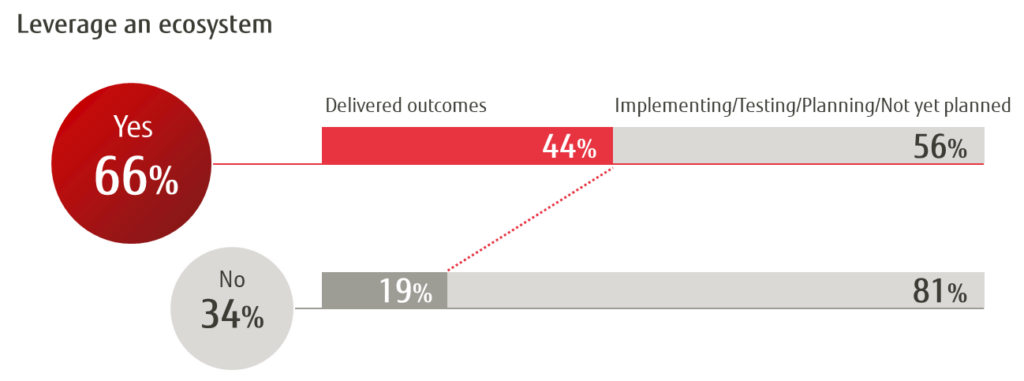
In the face of major ongoing disruption, the growing importance of supplier and partner ecosystems has become a major feature of the business landscape. As a result, it’s no longer viable for any organization, however large, to think they can do it all on their own.
The rapid pace of technology advances, including the emergence of disruptive technologies with the power to blur traditional industry sector boundaries, continues to create new markets, new players and new competition. In this rapidly changing world, the ability to work effectively in a flexible ecosystem model, with a willingness to share and collaborate, has become key to success.
Indeed, Fujitsu has identified the ability to work effectively in an ecosystem model as one of the key enablers, or ‘Digital Muscles’, required for successful transformation. This willingness to explore new collaborations, to open up new ecosystems and create new customer propositions, is fundamental to achieving desired transformation outcomes.

The reasons are clear. Healthy ecosystems drive mutual benefit, based on clearly defined rules and mutual incentives. At times of significant disruption, such as a global pandemic, they can provide much-needed resilience in supply chains and routes to market that no organization operating independently could hope to match. They can also provide the means for organizations to explore growth opportunities in new sectors and geographic markets.
Examples of ecosystem success
One great example of this is Ricex, an innovative global platform for rice trading. By creating a digital platform based around automation and Blockchain technologies, Ricex has been able to connect importers and exporters, as well as service providers like shipping companies, insurers and lawyers, to create a single global rice trading ecosystem. This has created new levels of efficiency and trust, driving up profits for small farmers and creating significant societal benefits.
Another excellent example demonstrates the value of industry and academia working together. Industry FIVE (Future Innovation Venture Exchange) was created by Fujitsu with Manchester university to bring together world-class research and industry business perspectives to address increasingly complex and diverse market challenges. Recently, the theme for this year’s annual ‘Fujitsu Distinguished Engineer’ (FDE) conference was based around Fujitsu Technology and Service Vision, this was an opportunity to present the findings from our recent joint white paper “Trust“ alongside highlighting the importance of ecosystem relationships.
So, how strong are your organization’s ecosystem muscles? How committed are you to developing the external relationships you need to future-proof your business? Do you have the ecosystems you need to survive disruption and exploit the exciting potential of digital transformation?
The best way to check is to take Fujitsu’s 5-minute Digital Muscles assessment. Do it today. The results might surprise you.











